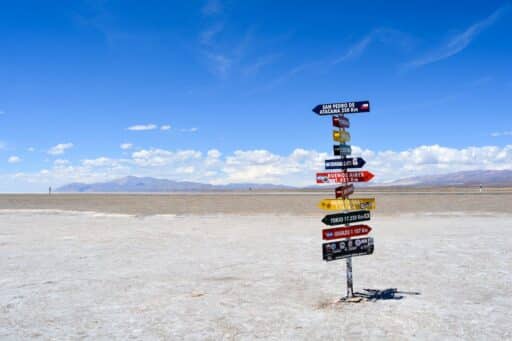Sitemap: Living abroad > Living in Argentina
In our comprehensive guide to living in Argentina, we’ll explore the intricacies of the day-to-day, delving into issues like the costs of living, residency and helpful knowledge for expat living and navigating the numerous parts of Argentine society.
In particular, the topics we’ll talk about include:
- Living in Argentina 101: All About Argentina
- Argentina weather
- What language does Argentina speak?
- Is Argentina safe for expats?
- Cost of living in Argentina
If you are looking to invest as an expat or high-net-worth individual, which is what I specialize in, you can email me (advice@adamfayed.com) or WhatsApp (+44-7393-450-837).
Living in Argentina 101: All About Argentina

Argentina weather
The Argentina region has a diverse climate due to its size and landforms. Buenos Aires has hot summers and mild winters in a humid subtropical climate. Tropical weather with high temperatures and humidity await you northward, with a wet season from December to March and a dry season from May to September.
The moderate climate of Central Argentina has warm summers and cool winters. Annual rainfall is spread out, with the biggest precipitation between October and March. Southern climates are frigid with strong winds and heavy snowfall.
Subpolar temperatures and strong winds characterize Patagonia, Argentina’s southernmost region. Snowfall occurs year-round, peaking in winter.
What language does Argentina speak?
The Argentina official language is Spanish, spoken by practically everyone as a first or second language. Argentina’s linguistic landscape is diverse, and many Argentinians speak Spanish influenced by foreign languages. International migration has led to enclaves of English, Arabic, French, Italian and German throughout the country.
Argentina’s linguistic variety is exceptional as well due to its many indigenous languages from diverse linguistic families.
Is Argentina safe for expats?
Moving to Argentina is generally considered risk-free, while it is prudent to avoid some high-threat locations. Pick-pocketing and muggings are a problem in Buenos Aires and Mendoza and other major cities. In Rosario especially, there is a rise in crime and violence because of narcotics and contraband trafficking.
Coastal waters in Argentina can be dangerous due to things like riptides, even though the country is not particularly prone to natural disasters.
Driving in Argentina requires some caution too due to a number of potential hazards. Many factors, including drivers’ erratic behavior and disregard for posted speed limits and traffic signals, must be taken into account. Also, drivers sometimes feel unsafe because they are targets of crime while waiting for green lights. Careful and cautious driving is especially important when traveling through rural areas.
Accommodation in Argentina
Traditional estancias in Argentina offer housing and outdoor activities like horseback riding and hiking, among other things. Several wine hotels can be found dispersed over the country’s famed wine regions.
Apartments are a good option for people who value solitude and personal space. Students and foreign workers find them to be an excellent alternative to traditional housing in the country. The monthly maintenance cost can have a sizable effect on the total rent, so it’s important to remember it.
Large, detached homes are common in the residential sections of Buenos Aires and other Argentine cities’ suburbs. Families with kids tend to be drawn to these homes because of the garden space, swimming pools, and garages that come standard.
Students and tourists who want to learn about the culture of Argentina should choose a homestay. These arrangements can be made through language schools and other institutions.

Best places to stay for your new life in Argentina
- The capital of Argentina, Buenos Aires, attracts expats with its dynamic cultural scene, including theater, ballet, restaurants, and nightlife. Its large expat community provides networking opportunities. Though generally safe, be cautious in specific locations, especially at night.
- Western Argentina’s Mendoza is known for its wine and outdoor sports. It has a slower pace than Buenos Aires, making it a good choice. Vineyards and restaurants abound in Mendoza, a foodie heaven.
- Digital nomads like Rosario within the central Argentina area. It has many coworking spaces and a thriving startup environment. Cultural activities and street art are also popular in Rosario.
- Experience Argentine gaucho culture in Salta in northern Argentina. The city has a laid-back vibe and constant sunshine. Also notable are its colonial architecture and museums.
- English speakers flock to the eastern Argentine city of La Plata, which has many universities and students. Also known for parks and museums.
- Mar del Plata on the Atlantic coast is an area of Argentina you can consider moving to that has many beaches and attracts tourists. The city’s nightlife and casinos are famous.
Cost of living in Argentina
Numbeo estimates a family of four in Argentina spends $1,590.3 per month, excluding rent. The anticipated monthly costs without rent for one person are $448.3.
Meanwhile, some expats, couples and those who wish to retire in Argentina can live comfortably on $1,000 to $1,800 per month.
In Argentina, most daily expenses are far cheaper than in certain other countries. For instance, apartment rentals in Argentina are 75% cheaper than in the US; the greatest rates are generally outside large cities.
Food costs average $246 per month for one person and $651 per month for a household of four. A $25 supper for two at a mid-range restaurant is also affordable.
In general, the Argentina cost of living is lower than the average salary in Argentina of around $200.
Related content: 2022 Cost of Living in Argentina
Can foreigners open a bank account?
Foreigners can open bank accounts in Argentina with proper documentation. Because Argentina needs foreign money to pay its debts, dollar accounts are scrutinized more than peso ones.
Expatriates in Argentina must provide a DNI, passport, proof of residence, business and personal tax codes, social security number, and a deposit to open a current account. Expats should check with individual banks for unique restrictions.
Permanent residents of Argentina can open savings accounts. Similar to Argentine citizens, immigrants just need their ID to open a peso savings account. An Office of Vital Statistics ID or passport from their home country is required to prove identity.
You can use your local bank account if someone overseas will send money to Argentina. You should consider fees and taxes when transferring money from an offshore to a local account.
If you want to invest, you can also check with local banks if they offer access to investment funds, for example. Banking regulations and fees can vary, so check with your bank to keep informed.
Related content:
Getting Money Out of Argentina
Transportation in Argentina
Long-distance buses and freight trucks are used frequently because of their low cost and the country’s intricate network of routes.
Expats won’t have any trouble moving around the major cities of Argentina because of the reliable public transit system. Public transportation in the country primarily consists of buses, which operate on large routes within major cities.
The long-distance bus network in Argentina is substantial and the main form of intercity travel inside the country. Some of these long-distance buses include in-seat eating and have decor similar to an airline’s business class.
Argentina is proud of its seventh-biggest railway network and South America’s largest. Although slower than buses, rail travel is cheaper for vast distances.
Taxis are an easy way to move around cities, and they even have meters. A prevalent problem for tourists from other countries is that taxi drivers might take longer or more circuitous routes in order to increase the fee.
Renting a car can be especially useful in less-traveled areas of Argentina, such as Patagonia, and the country’s spectacular national parks, where public transportation is few or irregular.
Can foreigners drive in Argentina?
Foreigners can drive in Argentina with a valid tourist visa and driver’s license from their own country.
Argentine car rentals don’t require an IDP if the driver passes certain standards. These requirements usually require a driver’s license in English or from the EU, European Economic Area, Australia, England, South Africa, Switzerland, the US, and Vienna Convention on Road Traffic countries.
However, laws and regulations might change and differ by rental firm, so it’s important to check.
After one year, permanent residents of Argentina must apply for an Argentine driver’s license to drive legally.

Are there international schools in Argentina?
Expats and their families can choose from a number of foreign schools in Argentina. Educators at several Buenos Aires-based international schools use a bilingual approach, teaching students in both English and Spanish. The language of instruction at these institutions is often determined by the chosen curriculum, which may not be the British or International Baccalaureate programs.
Several foreign schools in Buenos Aires may mandate students to wear uniforms. These uniforms are often required but not covered by the cost of tuition.
As an expat family, you may find that sending your child to an international school in Argentina is the best option for him or her to have a well-rounded education that will help them succeed in college and beyond.
Since undergraduate study at Argentina’s public universities is free for everyone, the groundwork supplied by international schools is all the more important in preparing pupils for success in college and beyond.
Healthcare and Insurance in Argentina
Residents of Argentina receive free or significantly discounted public healthcare. Free medical appointments, hospital visits, dental treatment, palliative care, rehabilitation, medical transport, and prostheses are covered.
Public sector healthcare can have varying quality and appointment wait times depending on the facility.
The quality of Argentina’s private healthcare sector is internationally recognized. A health insurance policy purchased in one city or region of Argentina may not be valid in another. This is because private health insurance is often localized. Therefore, it is crucial for expats to comprehend the extent of their personal insurance policy’s coverage.
Expats are generally encouraged to have health insurance even though it is not required in Argentina. Private health insurance can help people avoid long wait times in the public healthcare system and give them access to better quality medical care.
On Visa, Residency and Argentina Citizenship
Argentina requires long-term (residency) visas for residents, workers, students, and retirees. Argentina issues resident visas for numerous reasons:
- Temporary Residency: Foreigners engaged by Argentine companies or interns need a temporary residence visa. Renewable one-year visas are available.
- Financier Visa/Rentista Visa: For non-pensioners with a guaranteed monthly income of at least 30,000 Argentine Pesos. Valid for one year, renewable for three. You can then request permanent residency and Argentine citizenship.
- Family Reunification: Reunite with family in Argentina using this visa. Children, spouses, and parents of Argentine citizens or permanent residents are eligible. Registering with the government (Registro Nacional de las Personas) and getting a residence permit are required upon arrival.
- Argentina medical visa: For foreigners seeking treatment.
For stays over three months in Argentina, foreign nationals must register with the and get a residence permit. Residence permits can be renewed for three years, whereas work visas are good for one year.
Citizenship in Argentina can be obtained through birth, naturalization, or parenthood. You must live in Argentina for at least two years, prove employment, uninterrupted presence, and produce your passport, DNI, and national driving license to apply for naturalized citizenship.
While not required in Argentina, expats should get health insurance. The National Health Insurance Administration covers health, pensions/retirement, disability, related death benefits, and unemployment. Private health insurance gives expats faster and more comprehensive medical care.
Investment opportunities in Argentina
Argentina is known for its fertile agricultural land, making it a prime location for agricultural investments. The country is a major exporter of commodities such as soybeans, corn, and beef, with a strong global demand for its agricultural products.
Investing in agriculture in Argentina offers the potential for long-term growth and stable returns. Additionally, the country has vast natural resources, including oil, gas, and minerals, providing further opportunities for investors in the energy and mining sectors.
Real estate in Argentina
Argentina’s real estate market has been growing steadily, making it an attractive option for both local and foreign investors. The country offers a diverse range of properties, from luxury apartments in Buenos Aires to rural estates in the countryside.
One of the key advantages of investing in real estate in Argentina is the potential for high rental yields. The tourism industry is booming, driving demand for short-term rentals, particularly in popular tourist destinations such as Bariloche and Mendoza.
Related content: Investing in Argentina Real Estate for Expats
Stock market in Argentina
Argentina has a well-established stock market, known as the Bolsa de Comercio de Buenos Aires. Investing in stocks can be a lucrative option for those willing to take on a higher level of risk.
The stock market in Argentina has seen significant growth in recent years, driven by the country’s economic reforms and increased investor confidence. However, it’s important to note that the stock market can be volatile, so it’s essential to conduct thorough research and seek professional advice before investing.
Related content: 6 Best Online Trading Platforms in Argentina
Pained by financial indecision?

Adam is an internationally recognised author on financial matters with over 830million answer views on Quora, a widely sold book on Amazon, and a contributor on Forbes.

